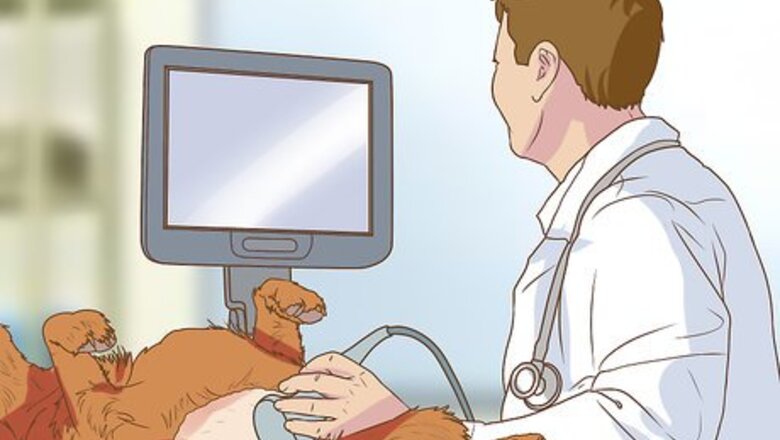
views
X
Research source
Preparing For a Preemie Puppy
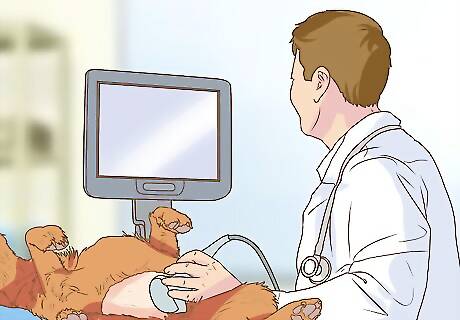
Get an ultrasound or x-rays done of the pregnant dog. Having x-rays done of the mother dog can show you whether or not she is having any preemie puppies. It also shows you how many puppies she is having. A veterinarian will not always be able to identify a preemie puppy with an ultrasound or x-rays. However, that is a chance that he or she will. Getting x-rays done is just one part of comprehensive prenatal care.
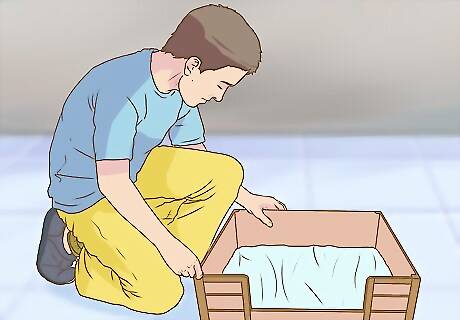
Prepare a place for delivery. Set up an area where your dog will give birth. This area should be isolated from other dogs. It should also be warm and comfortable for the dog. It should include a "nesting box," which is usually a low-sided box with towels or cushioning inside. Set up the nesting area about a week before you think the mother dog will give birth. Show it to her several days in advance. This will give her time to adjust to space and make it her own and help her feel safe there before she delivers. The padding inside the nesting box should be a material that can be easily cleaned or disposed of. It will get soiled during labor and delivery, and will need to be replaced.
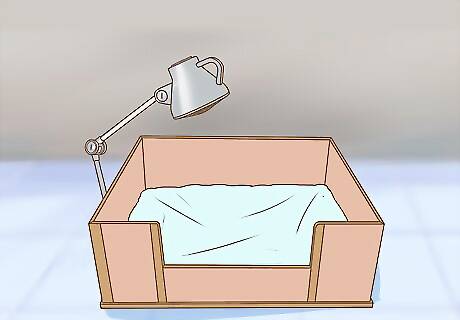
Set up a warming space for the preemie. You may also need a separate space where the preemie can be warmed even further. If a puppy is not warm enough it cannot digest food, so it is imperative that a preemie be kept very warm. This space can simply be a shoe box that can be warmed from the bottom and top. The bottom of the preemie can be warmed by a hot water bottle covered with towels. The top can be warmed with a heat lamp or light. Be careful with heating pads and heated blankets, though, as these may burn or overheat the new puppies. This space should have the capability of keeping the puppy at around 90°F (30°C).
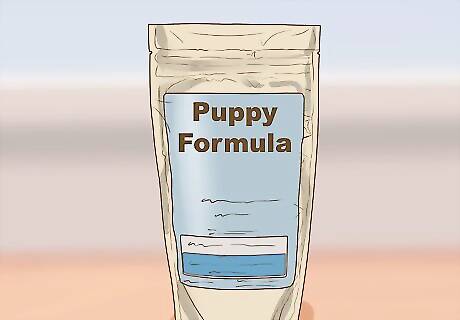
Buy puppy formula ahead of time. Newborn puppies need to eat every two to four hours throughout the day and night. Preemie puppies are especially prone to malnutrition, so you may need to give them extra food on top of what they get from nursing. Have the formula ready in case the puppies have a hard time nursing. If the puppy is extremely small and weak, it may not have the strength to nurse. If this is the case, you will need to give it all its nutrition. Puppy formula is sold in most pet stores and online. Be sure you get the right sized nipple for the bottle, too. If the hole is too small, the preemie won't be strong enough to get the formula out. If the hole is too big, the puppy could aspirate while trying to drink.
Delivering a Preemie Puppy
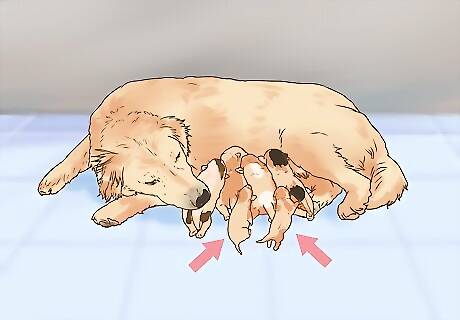
Identify any preemie puppies. As the mother dog is giving birth you should assess the puppies. You do not need to physically touch them so much as see if they are generally the same size and if they are breathing on their own. Preemies will be small, weak, thin, and may have less fur than full-sized puppies.
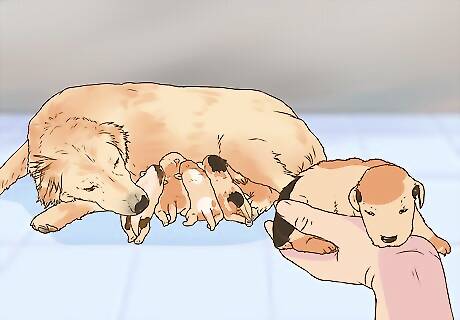
Decide whether you need to intervene. If a preemie is born you need to assess whether it needs your assistance or if it can get enough warmth and nutrition from its mother. If a preemie is a lot smaller than its siblings, then chances are that it will need assistance. If one of the puppies is just slightly smaller than the other puppies, then it will likely get enough food and warmth but you should keep an eye on its growth and development. A very small preemie, one that seems unwell, or one that is failing is at risk of dying. You should intervene in its care and get it veterinary care immediately. Call your vet in advance and let them know you're on your way. A veterinarian will be able to assess its health and give it life-saving treatment, such as feeding it with a feeding tube.
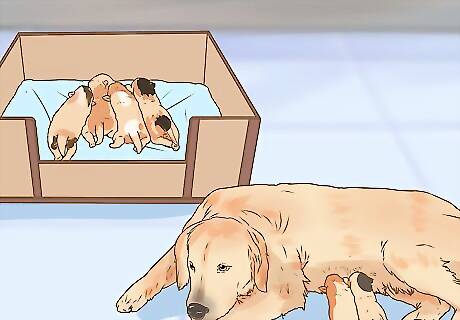
Watch to see if the preemie is being properly cared for. Even if you decide to allow the preemie puppy to be cared for by the mother, you should still keep a close eye on that care. You may need to assist the mother in caring for the preemie. For example, a preemie can have a hard time getting its fair share of its mother's milk if it has larger siblings. You may need to keep the other puppies away from the preemie when it suckles so that it gets enough to eat.
Caring For a Preemie Puppy
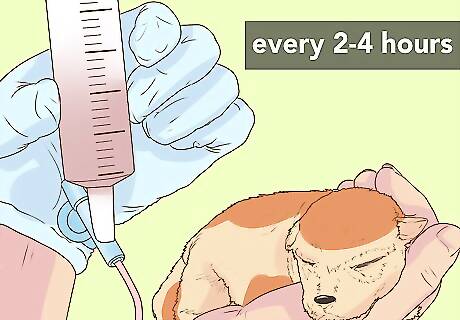
Feed the preemie every two to four hours. A preemie puppy needs food every couple hours in order to help it grow stronger. This means that you may need to hand feed it if it is unable to nurse on its own or if it is not getting enough milk from its mother. Some preemies need to be tube fed instead of bottle fed. Tube feeding requires you to place the formula in a syringe and then shoot the formula into the puppy's stomach via a tube. Discuss the health of the preemie with your veterinarian and discuss this option. You should get instructions from your vet about this process. This feeding even needs to occur throughout the night. This is one reason that caring for a preemie is a lot of work.
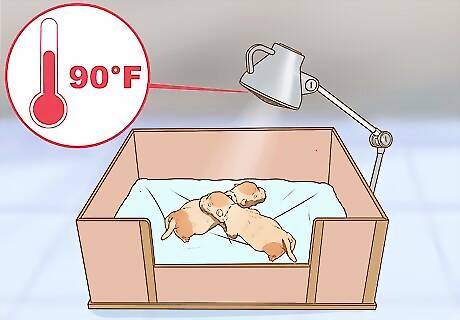
Check the temperature frequently. A puppy needs to be warm in order to successfully digest its food. Preemies, in particular, have a hard time keeping warm, so they will need some help. Check their temperature every hour or so. The puppy's internal temperature should be about 97°F (36°C).
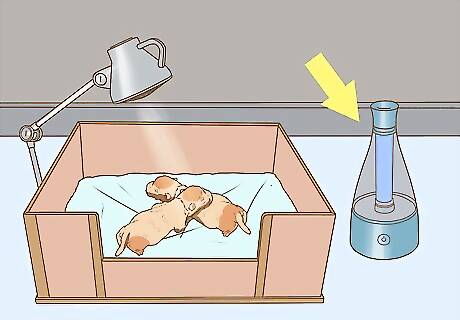
Humidify the environment. You may need to increase the moisture where you are keeping the puppy in order for it to avoid getting dehydrated. When you are heating the area, dehydration can happen very easily and quickly. Set up a humidifier near the puppy. This will help it to avoid getting dehydrated. If you don't have a humidifier you can introduce humidity by bringing boiling water into the room, placing the puppy in the bathroom with the shower running, or placing a damp towel on a heat vent in the room. However, you need to be very careful that you are not creating a safety hazard by using these methods.
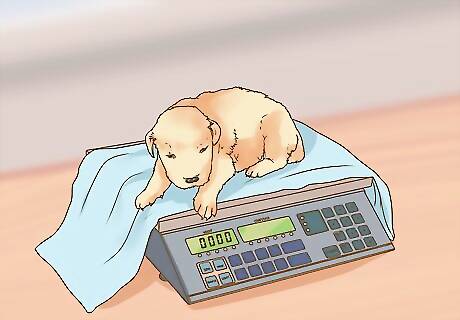
Keep track of the preemie's growth. You want to make sure that the preemie is gaining weight and reaching developmental milestones. Weigh it regularly and make sure it does not have any health issues developing. If the preemie is getting regular veterinary checkups, then your veterinarian will weigh it and assess its health as well. This does not mean that you don't have to keep an eye on the puppy's development and progression as well. A preemie should gain about ten percent of their birth weight every day after the day they are born. If it is not gaining that weight, then you should intervene to make sure it is getting enough food.










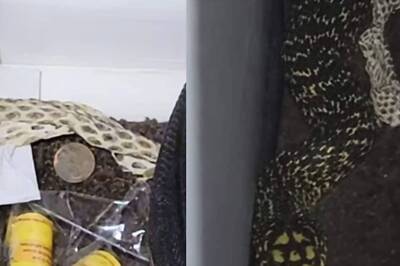








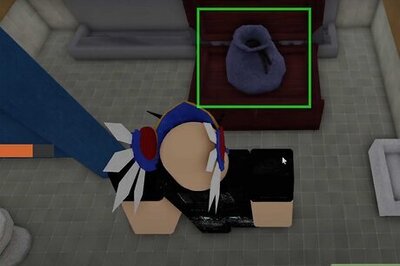
Comments
0 comment